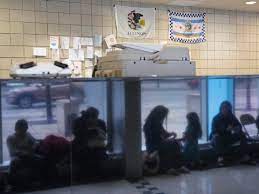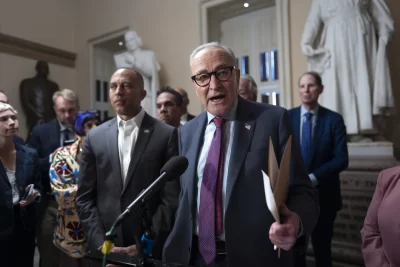
As more than 100,000 migrants arrived in New York City over the past year after crossing the border from Mexico, Mayor Eric Adams and Gov. Kathy Hochul have begged President Joe Biden for one thing, above all others, to ease the crisis:
“Let them work,” both Democrats have said repeatedly in speeches and interviews.
Increasingly impatient leaders of Biden’s party in other cities and states have hammered the same message over the last month, saying the administration must make it easier for migrants to get work authorization quickly, which would allow them to pay for food and housing.
But expediting work permits isn’t so easy, either legally or bureaucratically, experts in the process say. Politically, it may be impossible.
It would take an act of Congress to shorten a mandatory, six-month waiting period before asylum-seekers can apply for work permits. Some Democratic leaders say the Biden administration could take steps that wouldn’t require congressional approval. But neither action seems likely. Biden already faces attacks from Republicans who say he is too soft on immigration, and his administration has pointed to Congress’ inability to reach agreement on comprehensive changes to the U.S. immigration system as justification for other steps it has taken.
As frustrations have mounted, Hochul has said her office is considering whether the state could offer work permits, though such a move would almost certainly draw legal challenges. The White House has dismissed the idea.
Immigrants are frustrated as well. Gilberto Pozo Ortiz, a 45-year-old from Cuba, has been living, at taxpayer expense, in a hotel in upstate New York for the last three months. He says his work authorization is not yet in sight as social workers navigate him through a complex asylum application system.
“I want to depend on no one,” Ortiz said. “I want to work.”
In Chicago, where 13,000 migrants have settled in the last year, Mayor Brandon Johnson and Illinois Gov. J.B. Pritzker wrote Homeland Security Secretary Alejandro Mayorkas to ask for parole for asylum-seekers, which, they say, would allow him to get around the wait for a work permit.
Massachusetts Gov. Maura Healey, who declared a state of emergency over the migrant influx, wrote Mayorkas that work permits represent “an opportunity to meet employer needs, support our economy, and reduce dependency among new arrivals.” And 19 Democratic state attorneys general wrote Mayorkas that work permits would reduce the strain on government to provide social services.
The federal government has done “virtually nothing” to assist cities, said Chicago Alderman Andre Vasquez, chair of the City Council’s Committee on Immigrant and Refugee Rights.
In the meantime, migrants unable to get work permits have filled up homeless shelters in several cities.
With more than 60,000 migrants currently depending on New York City for housing, the city has rented space in hotels, put cots in recreational centers and erected tent shelters — all at government expense. The Adams administration has estimated that housing and caring for migrants could cost the city $12 billion over three years.
“This issue will destroy New York City,” Adams said at a community event this month. “We’re getting no support on this national crisis, and we’re receiving no support.”
Advocates for migrants have objected to Adams’ apocalyptic terms, saying he is exaggerating the potential impact of the new arrivals on a city of nearly 8.8 million people.
But protests against the migrants have escalated. Ten people were arrested on Staten Island late Tuesday when demonstrators blocked a bus carrying migrants. A police spokesperson said nine people were charged with disorderly conduct and one with assault.





